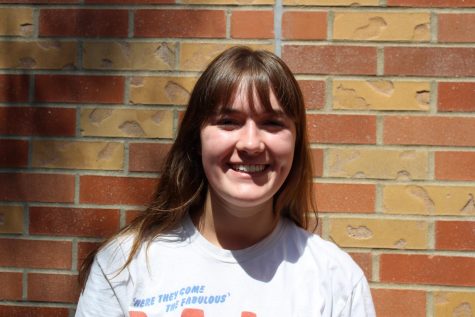Volunteering to SKIP
Two Olathe North students volunteer to help curb truancy at Project SKIP.
Olathe North students Reem Atallah and Khushi Kohli are working hard outside of school to ensure that other students stay inschool. Both are involved in Project SKIP, a program designed to rehabilitate truants.
Truancy is a problem in high schools, which have been shown to have the highest rates of truancy when compared to middle and elementary schools, according to the U.S Department of Education. In Johnson County, an initiative was started to correct this problem. According to Johnson County Court Services, Project SKIP is a prevention/early intervention program designed to help lower-level truants.“Project SKIP isn’t a punishment,” sophomore Khushi Kohli explains, “it’s a way to rehabilitate kids and make sure that they are getting the help at school and at home they need.”
Court services officer, Megan Easley, describes how the program was created. “A judge asked us to come up with a program that is similar to our Youth Court model but on the Child in Need of Care side of the law. We modeled this program off of an existing program that we already had in the county in order to offer help for low-level truant youth and a leadership and volunteer opportunity for youth in the county.”
According to the Johnson County District Attorney’s office, once a school claims that a student is truant, they refer that student to the District Attorney’s office. The school districts within Johnson County don’t have a problem with sharing their students’ information with Project SKIP. Rather than trying to withhold their student records, school districts make it their mission to work together with the program by recommending students. Once referred, the student is under the county’s discretion, which brings in Project SKIP.
Atallah and Kohli volunteer for Project SKIP on a regular basis, spending their time trying to better the lives of their peers, who are often suffering from issues outside of school. Kohli claims, “It shows me all of the different struggles students have, especially in high school.”
Atallah and Kohli became involved in the program the same way, as they were previously involved in Olathe Youth Court. Olathe Youth Court is an alternative to District Court for first time offenders of minor offenses such as: battery, criminal trespass, criminal damage to property, disorderly conduct, telephone harassment, and theft. Local students can volunteer as defendants for these cases, and if the offender completes all requirements, their criminal record is erased.
Adult leaders at Olathe Youth Court had recommended that Atallah and Kohli should become involved in Project SKIP. Atallah explains, “After getting involved in Youth Court, the director of Youth Services told me I should try Project Skip because it’s more of an interactive way to talk to students.”
20 to 30 Johnson County high schoolers volunteer for Project SKIP every year, many of them having previously served in Youth Court just like Kohli and Atallah. Meeting once a week at the courthouse, these students form a panel of attorneys, where they hear truant students’ cases. Positions on the panel include Panel Chair, Panel Member, and Student Service Officer (SSO).
Since Project SKIP helps truants who often go to the same school as the attorneys, there is a level of confidentiality that is established for new attorneys. According to Atallah, “We have to sign a contract when we first start volunteering, just to make sure we keep the information from each case confidential.”
After both girls signed up to volunteer, they underwent a training process. Atallah describes the process, saying, “You come for an hour of training and they go through all of the rules, statutes, and solutions for helping them get to school.”
Kohli explains what comes after, adding, “We just started going on the panels, and at first I didn’t really know exactly what to do. I watched as other people talked to the truants and asked them questions. As I kept going and learning more, I began to connect with the truants, and started to understand how we could help them.”
After going through a few cases with the guidance of those around them, student attorneys are expected to be prepared to face whatever lies ahead. Atallah describes the process each attorney goes through upon arriving at the Johnson County Court Services building. “At first, we look through a folder and see their [the student] name, what school they go to, their grades, and what specific classes they have been missing.” After this process, the panel creates questions for the truant student. Next, they meet with the student, and try to gain an understanding of why they’ve been truant. The student attorneys analyze their grades, social life, and any mental health issues that may be apparent.
After this meeting, the panel reconvenes to discuss possible solutions for the student. Kohli claims the most common suggestion for a truant student is tutoring. “A lot of times there are grade issues and they’re scared of going to school,” Kohli says.
Atallah enjoys this step of the process, saying, “It just feels really good after I can offer some solutions for those problems, so they can go back to school and be successful.”
Each student is paired with an SSO after being advised by the panel of attorneys. Kohli explains, “No matter who supports them, every couple of weeks we just text them and see how their school is going. If there’s any issues, we inform the leaders.”
The most significant element of this program is that fellow students decide how to help out their peers. Atallah believes approaching the issue in this fashion is more effective overall, and she explains, “I think a lot of adults don’t really understand the issues students deal with.”
Kohli agrees with this point, saying, “I think it’s more impactful because it’s a student, they’re your age, so you can really relate,” adding, “it’s really meaningful to have experiences with people who are living in the exact same conditions you are.”
Besides the satisfaction of knowing they are helping troubled students, Atallah and Kohli feel that they themselves have been positively impacted in various ways by volunteering for Project SKIP.
“I think the ability to connect with students who are struggling and helping them find success is what really appeals to me, and helping them get back on track and go to school also appeals to me,” Atallah explains, while describing how becoming involved has given her new insight to the struggles that some students deal with.
Atallah adds, “It’s also made me more empathetic, because now I understand what students are going through and get to help them, instead of just assigning them punishments.”
Kohli also believes that being involved in Project SKIP has taught her a lot, saying, “It’s taught me leadership, as I’ve learned to step up and volunteer, so it’s just been a great way for me to learn how to communicate.”
Kohli adds that volunteering for the program has allowed her to further connect with others, saying, “Before I was living in my ‘rose-colored world’ and once I went to Project SKIP I started to realize that many students are going through bullying or abuse, and other terrible conditions, so it really opened my eyes up.”

Number of years on the paper: 2
Grade Level: 12th grade, Senior
Favorite part of Newspaper: "I like interviewing and being able to meet new people"
Favorite...




